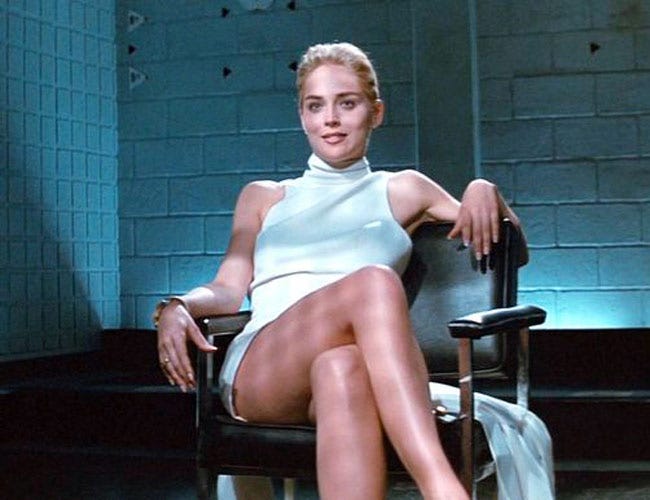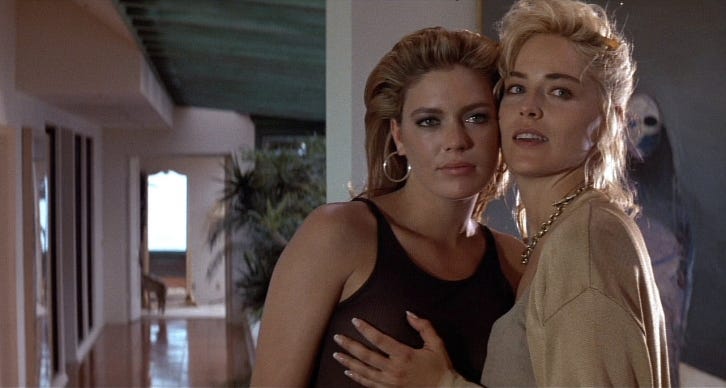basic instinct
Film, 1992, 3.5 stars
Directed: Paul Verhoeven
Written: Joe Eszterhas
Oh the controversy. Decades later, you still can't swing a dead theory around in a room full of feminists without hitting someone who thinks that Basic Instinct was the most loathsome film ever made.
If you listened to some critics, the film managed to single-handedly set back the cause of lesbian visibility in Hollywood by decades. It is the very embodiment of the evil lesbian cliché. It's also the film that revived Michael Douglas's flagging career and made Sharon Stone a megastar in the 10 seconds it took for her to uncross and re-cross her legs.
They could well be right, but I think there's some wiggle room for an opposing theory. The story centres around bad boy cop Nick (Michael Douglas) who is assigned to a murder case where the killer may or may not be writer Catherine Tramell, who has written a book that seems to describe the killing in lurid detail. Is the book a spooky confession of guilt, or the ultimate alibi? Who would be stupid, or clever, enough kill someone in the exact same manner as in their book? Only a psychopath.
Nick's partner Gus warns his partner off getting personally involved with both Catherine and his ex-lover Dr Beth Garner, the woman who is also in charge of evaluating his fitness to perform his job. Catherine's lover Roxy tries to kill Nick after Catherine and Nick share a night of hot sex and ends up dead herself. Also, as it turns out, Beth Garner used to be a woman named Lisa Hoberman, an obsessed ex-lover of Catherine's from college. Could she be killing men and trying to frame Catherine in revenge? The plot thickens.
The most damning evidence against Catherine appears to be that she's so good in bed and skilled at wielding an ice-pick, the very weapon used in the murder. Catherine seems to genuinely care about Nick, as far as she is able to anyway, but we find out that Catherine has a thing about befriending people who have killed other people. She seems to get off on it, presumably because she's been obsessed with death her whole life. Nick himself once killed a whole family of tourists while high on cocaine (but is somehow, insanely, back on the job anyway). They're perfect for each other, except for the whole pesky murder investigation thing.
Catherine is bisexual. So is Beth. Roxy is a lesbian through and through, but winds up dead for it. Catherine it would seem is actually innocent, or is she? Why would an innocent woman keep an ice-pick under her bed? And are we meant to believe that she doesn't stab Nick with it because he's so good in bed? Or does she keep it there merely as self protection believing that Nick himself may have been the murderer? (That's my own theory that no one wants to back me up on.)
No matter which way we look at it, lesbians and bisexual women in this film are murderers, junkies, suicidal, fetishist, violent, perverse and downright loony. The question is, do we or do we not like that in our lesbians? It might seem like a weird question, but there are some of us in the world who don't mind a bit of fun and spice in our characters. The only thing that makes it a slur is the accumulation of dead lesbians in past films. The characters here are internally consistent (as in, it isn't just the lesbians who are depraved, pretty much everyone is), and in the perversity stakes, I didn't feel that lesbians were being singled out.
That being said, the characters of Beth and Roxy don't have a salvageable trait to split between them. Catherine Tramell is different. She takes sex when she wants it, takes love where she finds it, does her own thing and takes crap from no one. She still feels, indulges her own passions and pursuits, is rich and drives a porsche. She dominates the lovers in her life and lives by her own rules. For these and many other reasons Catherine Tramell is a character I'm proud to call queer and to embrace as a strong and enduring film icon.
As for the film itself, it is a tautly woven thriller with good acting, a decent premise and a suitably ambiguous ending. Basic Instinct played out as perverse for the straight, white bread community to which it was pitched, but really in the grand scheme of things it isn't that bad. I've tried hard to be offended by it. I've picked it to pieces and back again. It isn't trying to represent the gay community, the fetishists or indeed any other social group. It's telling a story using characters with fluid personal boundaries. Some of those flaws turn out to be truly fatal. Depending on how you personally read the narrative, perhaps the femme fatale doesn't get her deserved punishment, but I like that about this movie. In real life we don't always get what we deserve.
Perhaps the most evil thing about this film was that it did so well the writer/director team thought they'd try again and produced Showgirls. Now there's a film to call loathsome.



